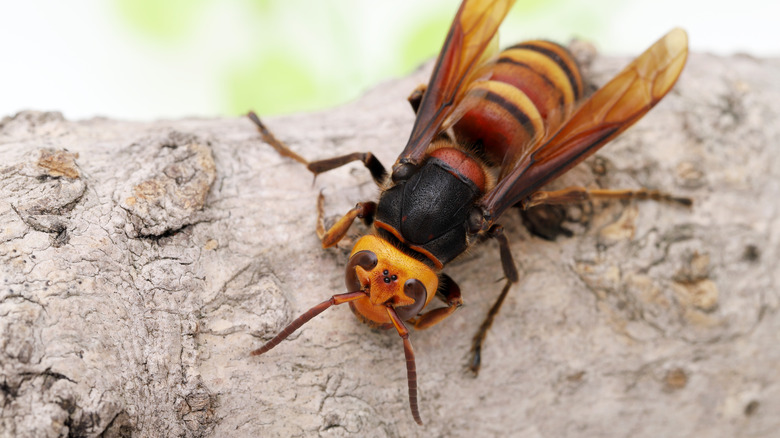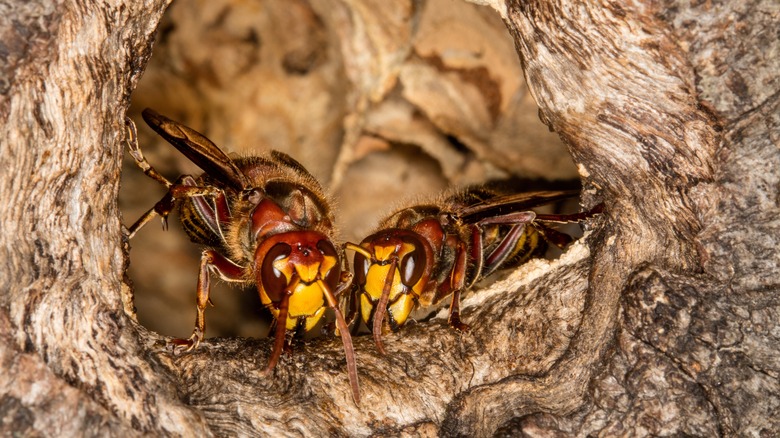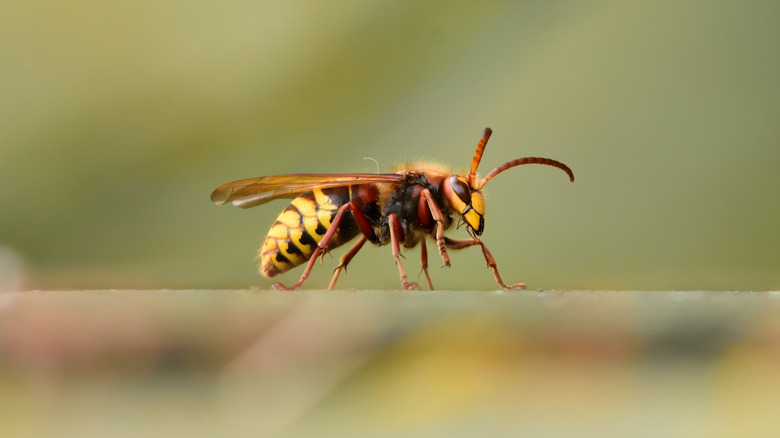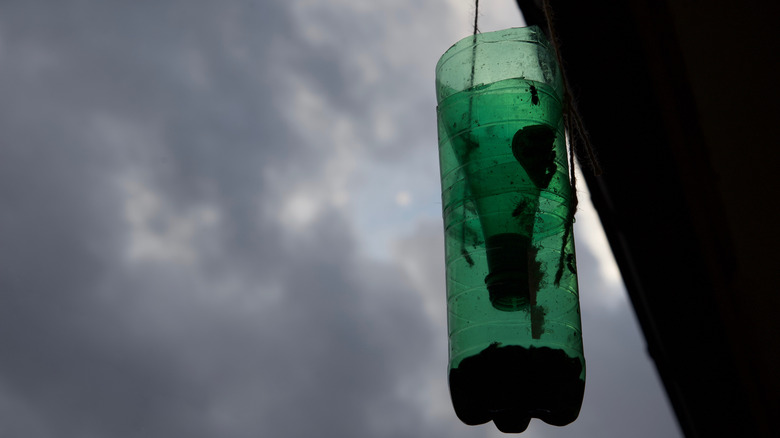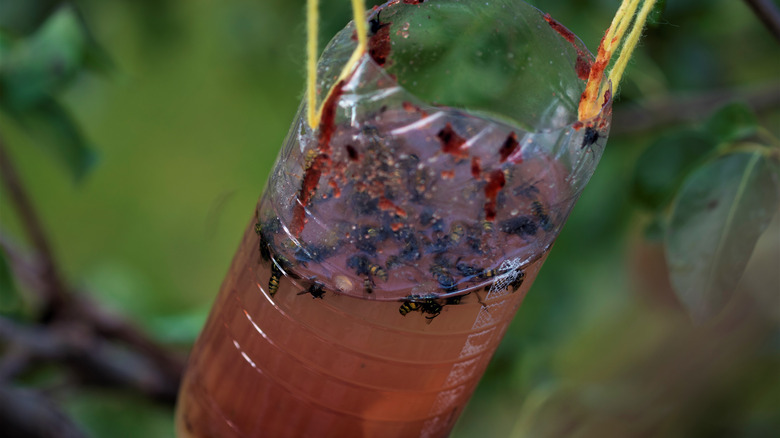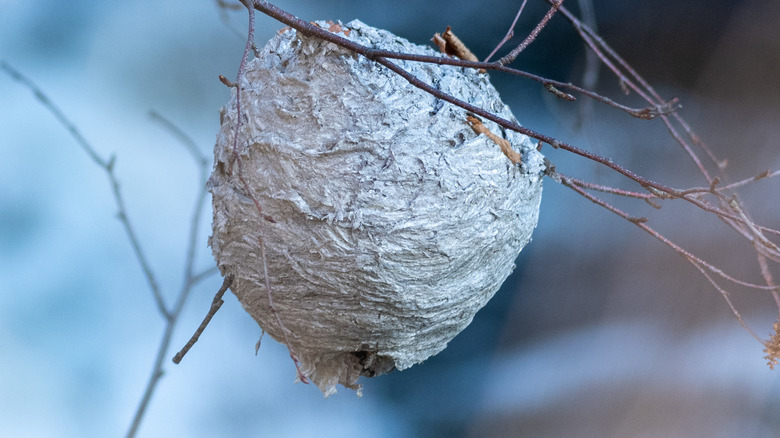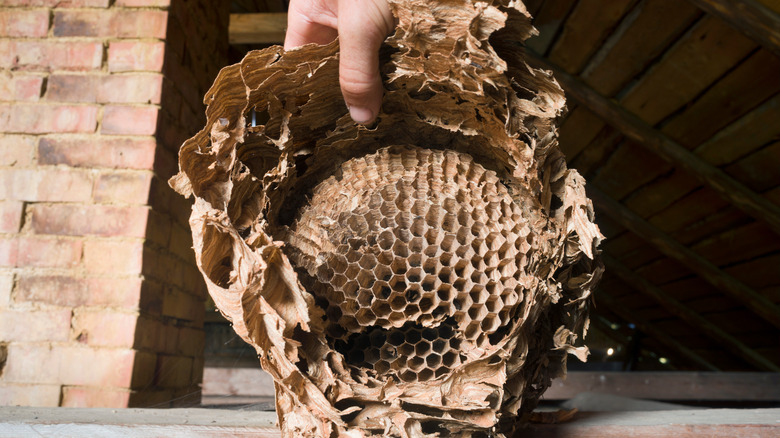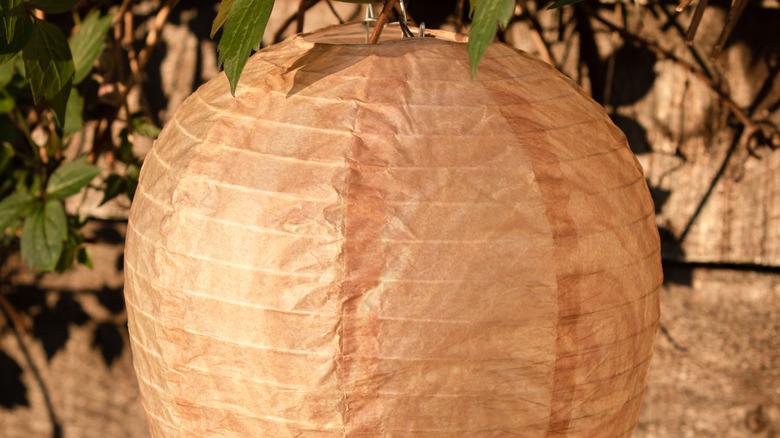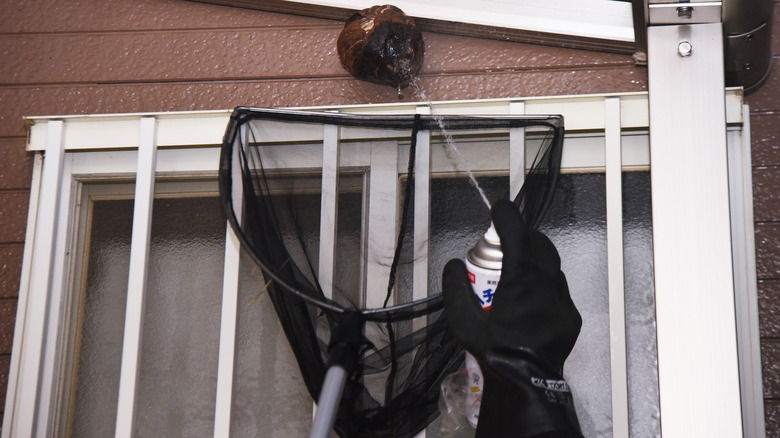8 Ways To Get Rid Of Hornets
Hornets aren't the friendliest neighbors, so take caution if you spot one of their papery nests in your yard or (gulp) in indoor spaces like attics or basements. These are the type of bugs you don't want living in your home. A variety of wasps, hornets are social insects that are particularly territorial of their domain, HowStuffWorks writes. If you approach a hornet nest or act aggressively toward them (like swatting them away), they will swarm and start stinging repeatedly. Given their larger size, they pack a bigger dose of venom, making their stings unpleasant.
While Treehugger argues that one can live peacefully alongside these waspy friends, many opt to send them packing. If you are allergic to hornet stings, don't attempt a DIY extraction. Instead, call in a professional and steer clear until the colony is gone. If you'd like to try to eradicate hornets yourself, there are a few approaches that don't involve harsh hornet insecticides. Here are some of the most effective and eco-friendly ways to eliminate them.
Signs of a hornet infestation
The first sign that you might have a hornet issue is seeing the insects frequently flying about your yard. Identifying them as hornets instead of honeybees or other flying insects is key. According to Command Pest Control, there are many types of hornets, and they are often very aggressive. They have similar characteristics to yellow jackets, yet hornets are larger in size. Keep your distance and avoid aggravating them. When they sting, hornets have the ability to release more pain-inducing venom than any other insect.
Another obvious indicator of infestation is finding a hornet's nest. Hornets either hang their nests or build them in holes in the ground. Check around your home for nest-like structures under your porch roof, in your garage, and attached to tree branches. Look carefully for nibbled wood on the exterior of your home as well. Hornets don't actually ingest wood (via Orkin). However, they chew it up and use the broken-down wood cellulose as building material when constructing their nests.
Prioritize safety when addressing hornet issues
Addressing a hornet's nest can be a dangerous task. Terro points out that when a hornet colony feels its nest is in danger, it will swarm in large numbers to protect itself. In extreme cases, these aggressive insects can inflict enough damage to cause shock and death. It's also important to be diligent about safety when treating nests in high places. Swarming hornets are known to cause falls from roofs and ladders, leading to injury. These risks prompt many homeowners to rely on professionals for safe and effective hornet removal.
If you choose to tackle hornet issues yourself, safety should be your top priority. Hornet stings are designed to immobilize and cause significant pain in prey (via Buzz About Bees). Given the sheer amount of venom they can release in a sting, getting attacked by just one or two can be significantly painful. Tackling a nest should only be done wearing protective clothing and tight-fitting goggles. Keep pets and children away from the area and work from as for of a distance from the nest as possible.
Sugar bottle trap
You might not think that a hornet has a sweet tooth, but they are indeed fans of sugar. It's what attracts them to your backyard barbecues, which you'd probably prefer they didn't attend. According to Kitchn, wasps especially crave sugar in late summer and early fall, making them more susceptible during that time to the sweet scent a sugar trap will waft their way.
The only things you'll need to set this hornet trap are a plastic soda bottle (12 oz is fine, or 2 liters for a larger-sized trap), sugar, and water. First, cut the top 1/4 of the plastic bottle off (the part you pour from and a few inches below). Flip it over and insert it into the bottom half so the "spout" faces down. Duct tape it in place. Next, dissolve 2 parts sugar with 1 part water and pour it inside. Place it outside, away from areas you usually hang out, but where wasps will easily reach it. Plant Care Today recommends coating the "spout" part with oil if wasps figure out how to fly out.
Vinegar trap
If your sugar trap attracts beneficial insects like honey bees, you can try a similar method using vinegar. Expert Pest Control suggests creating the same bottle trap (where you cut the top 1/4 off a soda bottle, flip it upside down, and insert it inside the bottom part), but pour in 1 cup of apple cider vinegar along with a drop of liquid dish soap. Next, add something to lure the hornets into your trap, like raw meat dangling from a string or 1 cup of sugar mixed into the vinegar solution. Hang or place it where the hornets like to hang out.
An alternate method for trapping them using apple cider vinegar is by using a bucket. Mix apple cider vinegar with sugar water and add dish soap. Hornets that fall into the water won't be able to escape once the soap coats their wings. LoveToKnow also suggests using protein bate to make this method even more effective.
Peppermint spray
When hornets are hovering nearby while you're outdoors, the scent of peppermint will encourage them to buzz off. Tips Bulletin writes that mixing 2 cups of water with 30 drops of peppermint essential oil, then mixing in 2 tablespoons of liquid dish soap in a spray bottle will create a powerful solution you can spray at hornets or around areas they like to visit. Plant Care Today also recommends leaving out peppermint-soaked cotton balls to discourage hornets from sticking around (though you'll have to replace these often). Tuck them into eaves or crevices they've previously tried to nest.
To really add a punch to your peppermint spray that will take down a nest, create a 50-50 solution of water and white vinegar. Mix in 20 drops of peppermint essential oil per 1 ounce of the solution, as well as 1 tablespoon of dish detergent per 1 cup of it. Wasps sleep after dark, and you'll want to approach the nest when they're not active. Spray the solution in powerful bursts onto the nest (without bursting it open) until it's soaked, and repeat in the area to repel future nest-building.
Borax
Borax is deadly to hornets, making it a relatively inexpensive solution to eradicate the pests. If you're tired of them ruining your yard, HomeSteady recommends creating tempting bate by mixing equal parts borax with something sweet and sticky, like honey or corn syrup. Scoop spoonfuls of the mixture onto old lids and place them near their nest. The sweet substance will poison hornets, but borax can also harm pets and other animals, so make sure they can't reach your mixture. Also, remove dead wasps from the ground so pets can't decide to nibble on them.
Best Plants writes that diatomaceous earth pesticides (derived from tiny fossilized aquatic organisms) will also kill wasps by causing them to dry out, and talcum powder and cinnamon will repel them. Sprinkle whichever powder you choose near the entrance of nests (where the hornets fly in and out), especially if they are located in walls or underground.
Submerge nests
Another way to manage hornet nests is to drown them out. Eartheasy says you can submerge aerial nests if you carefully remove them. After dark, when the colony is resting, approach the nest carefully and cover it completely with a cloth bag. Quickly tie off the top so hornets cannot escape. Put the bag in a bucket of water and weigh it down, so it sinks.
They don't recommend flooding (or burning) an open or underground nest with water since angry hornets can escape and attack. But Tips Bulletin notes that their wings will be coated if you add soap to the water, making it harder for them to escape. They write that you can mix boiling water with liquid dish soap for ground nests. Add it to a watering can that can withstand heat and quickly pour it into the nest entrance at night. If you can, block the opening with a bowl or bucket and skedaddle. You won't want to be around to feel their wrath if they fly out.
Vacuum them up
Indoor wasp infestations, like in attics, are extra creepy. One trick to removing them from enclosed spaces is to simply vacuum them up. Per Tips Bulletin, if you have a shop vac handy, you're halfway there. Add water and dish soap to the shop vac's tub. Put on protective clothing and approach the nest when the hornets aren't active. Place the nozzle near the nest, turn it on, and leave the space.
Cottage Life says that the soapy water inside the vacuum will attract the hornets, and they'll get sucked in once they approach it, drowning once inside. You'll need to run the shop vac for a few hours to clear out as many hornets as possible. If the nest is high up, they recommend fastening a pole or mop handle to the vacuum's hose with bungee cords and leaning it against a wall, with the nozzle pointed toward the nest.
Make your yard less hornet-friendly
To make sure hornets stay away, you'll need to make your yard less hospital to them. Discourage them from setting up a nest in or around your home by hanging fake wasp nests. Treehugger writes that given their territorial nature, they'll want to space themselves out if they think other wasps set up shop. You can buy fake nests, and even hanging a paper bag might do the trick.
Plants that repel wasps include peppermint, eucalyptus, citronella, and thyme, according to Plant Care Today. They also recommend hanging a baggy filled with water and a penny to scare them off because when the penny catches the light, hornets could mistake it for a spider web. Old CDs, mirrors, or reflective mobiles might also do the trick (via Expert Pest Control). If your yard has fruit trees, clean up fallen fruit before it begins to rot and ferment. HowStuffWorks writes that hornets will eat the fruit and become aggressive toward people and pets afterward. Finally, Eartheasy says to patch up holes in screens and seal cracks or gaps around vents, doorframes, eaves, and windows, so they don't have easy access to your home.
Another way to make your yard less welcoming to pesky hornets is to either darken it or light it strategically. Hornets, like many insects, are drawn to bright sources of exterior illumination like floodlights and glowing porch lanterns (via CAES Newswire). You can simply keep your outdoor lights turned off. However, this can cause safety and security concerns. Instead, switch your light bulbs to a soft yellow or amber hue. This shade of light isn't as attractive to most insects, so you can still have an illuminated exterior with fewer hornets.
All wasps, including hornets, are attracted to sugary drinks, meat, and produce scraps that likely fill your trash cans. Entomologist and pest control company owner Ryan Smith suggests keeping these cans and compost bins securely covered to avoid attracting them to your space. He tells BestLife, "These pollinators are on the lookout for food, and they love to feed on sweets, like fruit juices and honey, and protein food, such as dairy products."
Hornets are also attracted to water sources for drinking and gathering water with their mandibles to build their nests (via Go Pest Solutions). Consider emptying water features like fountains or bird baths to avoid attracting them to your yard. If you have a pool or hot tub, keep it covered when not in use.
Call in the pros
There are many benefits to leaving hornet removal to the pros. This is a no-brainer if you're allergic to their stings, but it also makes sense if you aren't sure where the colony resides, are dealing with a nest positioned somewhere high, or don't want to risk getting stung by a hoard of angry insects. Large or hard-to-reach nests can be particularly dangerous. Loyal Termite & Pest Control does not recommend taking on a nest larger than a fist by yourself. Working with exterminators may also nip the infestation in the bud for good if hornets return often.
Find a reliable exterminator and ask how they remove hornets and what chemicals they use. If you have pets or small children, ensure the area is cleaned up before accessing it. Dead hornets shouldn't be left lying around, especially if harsh insecticides killed them. Keep these tips in mind, and your hornet infestation should be over in no time.
